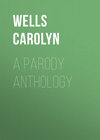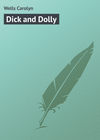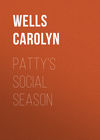Читать книгу: «A Parody Anthology», страница 13
Шрифт:
AFTER WILLIAM WATSON
THE THREE MICE
THREE mice – three sightless mice – averse from strife,
Peaceful descendants of the Armenian race,
Intent on finding some secluded place
Wherein to pass their inoffensive life;
How little dreamt they of that farmer's wife —
The Porte's malicious minion – giving chase,
And in a moment – ah, the foul disgrace! —
Shearing their tails off with a carving-knife!
And oh, my unemotional countrymen,
Who choose to dally and to temporize,
When once before with vitriolic pen
I told the tale of Turkish infamies,
Once more I call to vengeance, – now as then,
Shouting the magic word "Atrocities!"
Anthony C. Deane.
AFTER KIPLING
FUZZY WUZZY LEAVES US
WE'VE been visited by men across the seas,
And some of them could write, and some could not;
The English, French, and German – whom you please,
But Kipling was the finest of the lot.
In sooth, we're loath to lose him from our list;
Though he's not been wholly kind in all his dealings;
Indeed from first to last I must insist,
He has played the cat and banjo with our feelings.
But here's to you, Mr. Kipling, with your comments and your slurs;
You're a poor, benighted Briton, but the Prince of Raconteurs!
We'll give you your certificate, and if you want it signed,
Come back and have a fling at us whenever you're inclined!
You harrowed us with murder and with blood;
You dipped us deep in Simla's petty guile;
Yet we have found ourselves misunderstood
When we served you a sensation in our style;
And though you saw some grewsome pictures through
The Windy City's magnifying lens,
Yet we took it just a little hard of you,
A-objecting to the slaughter of our pens!
But here's to you, Mr. Kipling, and the boys of Lung-tung-pen,
And all we have to ask you is, make 'em kill again!
For though we're crude in some things here, which fact I much deplore,
We know genius when we see it, and we're not afraid of gore.
And yet we love you best on Greenough Hill,
By Bisesa and her sisters dark perplext;
In your sermons, which have power to lift and thrill
Just because they have the heart of man as text;
And when you bend, the little ones to please,
With Bagheera and Baloo at hide and seek,
Oh! a happy hour with Mowgli in the trees
Sets a little chap a-dreaming for a week.
So, here's to you, Mr. Kipling, and to Mowgli and Old Kaa,
And to her who loved and waited where the Gates of Sorrow are;
For where is brush more potent to paint since Art began
The white love of a Woman and the red blood of a Man.
So, since to us you've given such delight,
We hope that you won't think us quite so bad.
You're all hot sand and ginger, when you write,
But we're sure you're only shamming when you're mad.
Yet so you leave us Gunga Din's salaam,
So you incarnate Mulvaney on a spree;
Mr. Kipling, sir, we do not "care a damn"
For the comments you may make on such as we!
Then here's to you, Mr. Kipling, and Columbia avers
You're a poor, benighted Briton, but the Prince of Raconteurs.
You may scathe us, and may leave us; still in our hearts will stay
The man who made Mulvaney and the road to Mandalay.
E. P. C.
A BALLAD
(In the manner of R-dy-rd K-pl-ng)
AS I was walkin' the jungle round, a-killin' of tigers an' time;
I seed a kind of an author man a writin' a rousin' rhyme;
'E was writin' a mile a minute an' more, an' I sez to 'im, "'Oo are you?"
Sez 'e, "I'm a poet – 'er majesty's poet – soldier an' sailor, too!"
An 'is poem began in Ispahan an' ended in Kalamazoo,
It 'ad army in it, an' navy in it, an' jungle sprinkled through,
For 'e was a poet – 'er majesty's poet – soldier an' sailor, too!
An' after, I met 'im all over the world, a doin' of things a host;
'E 'ad one foot planted in Burmah, an' one on the Gloucester coast;
'E's 'alf a sailor an' 'alf a whaler, 'e's captain, cook, and crew,
But most a poet – 'er majesty's poet – soldier an' sailor too!
'E's often Scot an' 'e's often not, but 'is work is never through,
For 'e laughs at blame, an' 'e writes for fame, an' a bit for revenoo, —
Bein' a poet – 'er majesty's poet – soldier an' sailor too!
'E'll take you up to the Ar'tic zone, 'e'll take you down to the Nile,
'E'll give you a barrack ballad in the Tommy Atkins style,
Or 'e'll sing you a Dipsy Chantey, as the bloomin' bo'suns do,
For 'e is a poet – 'er majesty's poet – soldier an' sailor too.
An' there isn't no room for others, an' there's nothin' left to do;
'E 'as sailed the main from the 'Orn to Spain, 'e 'as tramped the jungle through,
An' written up all there is to write – soldier an' sailor, too!
There are manners an' manners of writin', but 'is is the proper way,
An' it ain't so hard to be a bard if you'll imitate Rudyard K.;
But sea an' shore an' peace an' war, an' everything else in view —
'E 'as gobbled the lot! – 'er majesty's poet – soldier a'n sailor, too.
'E's not content with 'is Indian 'ome, 'e's looking for regions new,
In another year 'e'll 'ave swept 'em clear, an' what'll the rest of us do?
'E's crowdin' us out! – 'er majesty's poet – soldier an' sailor too!
Guy Wetmore Carryl.
JACK AND JILL
H ERE is the tale – and you must make the most of it!
Here is the rhyme – ah, listen and attend!
Backwards – forwards – read it all and boast of it
If you are anything the wiser at the end!
Now Jack looked up – it was time to sup, and the bucket was yet to fill;
And Jack looked round for a space and frowned, then beckoned his sister Jill,
And twice he pulled his sister's hair, and thrice he smote her side;
"Ha' done, ha' done with your impudent fun – ha' done, with your games!" she cried;
"You have made mud-pies of a marvellous size – finger and face are black,
You have trodden the Way of the Mire and Clay – now up and wash you, Jack!
Or else, or ever we reach our home, there waiteth an angry dame —
Well you know the weight of her blow – the supperless open shame!
Wash, if you will, on yonder hill – wash if you will, at the spring, —
Or keep your dirt, to your certain hurt, and an imminent walloping!"
"You must wash – you must scrub – you must scrape!" growled Jack, "you must traffic with can and pails,
Nor keep the spoil of the good brown soil in the rim of your fingernails!
The morning path you must tread to your bath – you must wash ere the night descends,
And all for the cause of conventional laws and the soapmaker's dividends!
But if 't is sooth that our meal in truth depends on our washing, Jill,
By the sacred right of our appetite – haste – haste to the top of the hill!"
They have trodden the Way of the Mire and Clay, they have toiled and travelled far,
They have climbed to the brow of the hill-top now, where the bubbling fountains are,
They have taken the bucket and filled it up – yea, filled it up to the brim;
But Jack he sneered at his sister Jill, and Jill she jeered at him:
"What, blown already!" Jack cried out (and his was a biting mirth!)
"You boast indeed of your wonderful speed – but what is the boasting worth?
Now, if you can run as the antelope runs, and if you can turn like a hare,
Come, race me, Jill, to the foot of the hill – and prove your boasting fair!"
"Race? What is a race?" (and a mocking face had Jill as she spake the word)
"Unless for a prize the runner tries? The truth indeed ye heard,
For I can run as the antelope runs, and I can turn like a hare: —
The first one down wins half a crown – and I will race you there!"
"Yea, if for the lesson that you will learn (the lesson of humbled pride),
The price you fix at two-and-six, it shall not be denied;
Come, take your stand at my right hand, for here is the mark we toe:
Now, are you ready, and are you steady? Gird up your petticoats? Go!"
And Jill she ran like a winging bolt, a bolt from the bow released,
But Jack like a stream of the lightning gleam, with its pathway duly greased;
He ran down hill in front of Jill like a summer lightning flash —
Till he suddenly tripped on a stone, or slipped, and fell to the earth with a crash.
Then straight did rise on his wondering eyes the constellations fair,
Arcturus and the Pleiades, the Greater and Lesser Bear,
The swirling rain of a comet's train he saw, as he swiftly fell —
And Jill came tumbling after him with a loud, triumphant yell:
"You have won, you have won, the race is done! And as for the wager laid —
You have fallen down with a broken crown – the half-crown debt is paid!"
They have taken Jack to the room at the back where the family medicines are,
And he lies in bed with a broken head in a halo of vinegar;
While, in that Jill had laughed her fill as her brother fell to earth
She had felt the sting of a walloping – she hath paid the price of her mirth!
Here is the tale – and now you have the whole of it!
Here is the story, well and wisely planned;
Beauty – Duty – these make up the soul of it —
But, ah, my little readers, will you mark and understand?
Anthony C. Deane.
THE LEGEND OF REALISM
THIS is the sorrowful story,
Told when the twilight fails,
And the authors sit together
Reading each other's tales.
"Our fathers lived in the cloudland,
They were Romanticists,
They went down to the valley
To play with the Scientists.
"Our fathers murmured of moonshine,
Our fathers sang to the stars,
Our fathers were playfully prolix,
Our fathers knew nothing of 'pars.'
"Then came the terrible savants,
Nothing of play they knew,
Only – they caught our fathers,
And set them to burrow too.
"Set them to work in the workshop,
With crucible, test, and scales,
Put them in mud-walled prisons,
And – cut up their beautiful tales.
"Now we can read our fathers,
Trenchant, and terse, and cold,
Stooping to dig in dust-heaps,
Sharing the common mold.
"Driving a quill quotidian,
Mending a muddy plot,
Sitting in mud-walled prisons,
Steeping their souls in rot.
"Thus and so do our fathers,
Thus and so must we do,
For we are the slaves of science,
And we are Realists too."
This is the horrible story,
Told as the twilight fails,
And the authors sit together
Reading each other's tales.
Hilda Johnson.
AFTER STEPHEN PHILLIPS
LITTLE JACK HORNER
Littlé Jack Horner sát in án anglé Meditating.
Before we go farther,
Please clearly understand this is blank verse.
If it reads strangely, and the accent falls
In unexpected places, do not dare
To criticise. Remember once for all,
That I and Milton judge questións like that —
Vide my letters to the daily press.
As for my critics – wholesale ignorance
Were a term far too mild to paint their gross
Unintellectuality. So much said,
I start again.
In a cornér he sat,
Remote from comrades. Resolutely his hand
Clutched a delicious pie. Anon his thumb
From thé pasty depth próduced á curránt.
(Excuse another interruption, but
Observe the beauty of that ultimate line!
With equal ease I might have written it
"Produced a currant from the pasty depth,"
But I – and Milton in his better moments —
Prefer to be original.) In his soul
The obsession of his own superior virtue
Grew and prevailed, till at the last he cried:
"I am a Paragon of Excellence!"
Happy Jack Horner, thus fully convinced
Of his remarkable superiority!
And happy readers, who peruse his tale
Retold in such magnificent blank verse!
Anthony C. Deane.
AFTER FIONA McLEOD, W. B. YEATS, AND OTHERS
THE CULT OF THE CELTIC
WHEN the eager squadrons of day are faint and disbanded,
And under the wind-swept stars the reaper gleans
The petulant passion flowers – although, to be candid,
I haven't the faintest notion what that means —
Surely the Snow-White Bird makes melody sweeter
High in the air than skimming the clogging dust.
(Yes, there's certainly something queer about this metre,
But, as it's Celtic, you and I must take it on trust.)
And oh, the smile of the Slave as he shakes his fetters!
And oh, the Purple Pig as it roams afar!
And oh, the – something or other in capital letters —
As it yields to the magic spell of a wind-swept star!
And look at the tricksy Elves, how they leap and frolic,
Ducking the Bad Banshee in the moonlit pool,
Celtic, yet fully content to be "symbolic,"
Never a thought in their heads about Home Rule!
But the wind-swept star – you notice it has to figure,
Taking an average merely, in each alternate verse
Of every Celtic poem – smiles with a palpable snigger,
While the Yellow Wolf-Hound bays his blighting curse,
And the voices of dead desires in sufferers waken,
And the voice of the limitless lake is harsh and rough,
And the voice of the reader, too, unless I'm mistaken,
Is heard to remark that he's had about enough.
But since the critics have stated with some decision
That stanzas very like these are simply grand,
Showing "a sense of beauty and intimate vision,"
Proving a "Celtic Renaissance" close at hand;
Then, although I admit it's a terrible tax on
Powers like mine, yet I sincerely felt
My task, as an unintelligent Saxon,
Was, at all hazards, to try to copy the Celt!
Anthony C. Deane.
AFTER VARIOUS WRITERS OF VERS DE SOCIÉTÉ
BEHOLD THE DEEDS!
(Chant Royal)
(Being the Plaint of Adolphe Culpepper Ferguson, Salesman of Fancy Notions, held in durance of his Landlady for a failure to connect on Saturday night)
I
I WOULD that all men my hard case might know;
How grievously I suffer for no sin:
I, Adolphe Culpepper Ferguson, for lo!
I, of my landlady am locked in.
For being short on this sad Saturday,
Nor having shekels of silver wherewith to pay,
She has turned and is departed with my key;
Wherefore, not even as other boarders free,
I sing (as prisoners to their dungeon stones
When for ten days they expiate a spree):
Behold the deeds that are done of Mrs. Jones!
II
One night and one day have I wept my woe;
Nor wot I when the morrow doth begin,
If I shall have to write to Briggs & Co.,
To pray them to advance the requisite tin
For ransom of their salesman, that he may
Go forth as other boarders go alway —
As those I hear now flocking from their tea,
Led by the daughter of my landlady
Pianoward. This day for all my moans,
Dry bread and water have been servèd me.
Behold the deeds that are done of Mrs. Jones!
III
Miss Amabel Jones is musical, and so
The heart of the young he-boarder doth win,
Playing "The Maiden's Prayer," adagio —
That fetcheth him, as fetcheth the banco skin
The innocent rustic. For my part, I pray:
That Badarjewska maid may wait for aye
Ere sits she with a lover, as did we
Once sit together, Amabel! Can it be
That all of that arduous wooing not atones
For Saturday shortness of trade dollars three?
Behold the deeds that are done of Mrs. Jones!
IV
Yea! she forgets the arm was wont to go
Around her waist. She wears a buckle whose pin
Galleth the crook of the young man's elbow;
I forget not, for I that youth have been.
Smith was aforetime the Lothario gay.
Yet once, I mind me, Smith was forced to stay
Close in his room. Not calm, as I, was he;
But his noise brought no pleasaunce, verily.
Small ease he gat of playing on the bones,
Or hammering on his stove-pipe, that I see.
Behold the deeds that are done of Mrs. Jones!
V
Thou, for whose fear the figurative crow
I eat, accursed be thou and all thy kin!
Thee will I show up – yea, up will I show
Thy too thick buckwheats, and thy tea too thin
Ay! here I dare thee, ready for the fray!
Thou dost not keep a first-class house, I say!
It does not with the advertisements agree.
Thou lodgest a Briton with a pugaree,
And thou hast harbored Jacobses and Cohns,
Also a Mulligan. Thus denounce I thee!
Behold the deeds that are done of Mrs. Jones!
ENVOY
Boarders! the worst I have not told to ye:
She hath stole my trousers, that I may not flee
Privily by the window. Hence these groans,
There is no fleeing in a robe de nuit.
Behold the deeds that are done of Mrs. Jones!
H. C. Bunner.
CULTURE IN THE SLUMS
(Inscribed to an Intense Poet)
"O CRIKEY Bill!" she ses to me, she ses,
"Look sharp," ses she, "with them there sossiges.
Yea! sharp with them there bags of mysteree!
For lo!" she ses, "for lo! old pal," ses she,
"I'm blooming peckish, neither more or less."
Was it not prime – I leave you all to guess
How prime – to have a Jude in love's distress
Come spooning round, and murmuring balmilee,
"O crikey, Bill!"
For in such rorty wise doth Love express
His blooming views, and asks for your address,
And makes it right, and does the gay and free.
I kissed her – I did so! And her and me
Was pals. And if that ain't good business,
O crikey, Bill!
W. E. Henley.
A BALLADE OF BALLADE-MONGERS
(After the manner of Master François Villon of Paris)
IN Ballades things always contrive to get lost,
And Echo is constantly asking where
Are last year's roses and last year's frost?
And where are the fashions we used to wear?
And what is a "gentleman," and what is a "player"?
Irrelevant questions I like to ask:
Can you reap the tret as well as the tare?
And who was the Man in the Iron Mask?
What has become of the ring I tossed
In the lap of my mistress false and fair?
Her grave is green and her tombstone mossed;
But who is to be the next Lord Mayor?
And where is King William, of Leicester Square?
And who has emptied my hunting flask?
And who is possessed of Stella's hair?
And who was the Man in the Iron Mask?
And what became of the knee I crossed,
And the rod and the child they would not spare?
And what will a dozen herring cost
When herring are sold at three halfpence a pair?
And what in the world is the Golden Stair?
Did Diogenes die in a tub or cask,
Like Clarence, for love of liquor there?
And who was the Man in the Iron Mask?
ENVOY
Poets, your readers have much to bear,
For Ballade-making is no great task,
If you do not remember, I don't much care
Who was the man in the Iron Mask.
Augustus M. Moore
AFTER VARIOUS POPULAR SONGS
BEAUTIFUL SNOW
(With a drift)
OH! the snow, the beautiful snow
(This is a parody, please, you know;
Over and over again you may meet
Parodies writ on this poem so sweet;
Rhyming, chiming, skipping along,
Comical bards think they do nothing wrong;
Striving to follow what others have done,
One to the number may keep up the fun).
Beautiful snow, so gently you scud,
Pure for a minute, then dirty as mud!
Oh! the snow, the beautiful snow!
Here's a fine mess you have left us below;
Chilling our feet to the tips of our toes;
Cheekily landing full pert on our nose;
Jinking, slinking, ever you try
'Neath our umbrella to flop in our eye;
Gamins await us at every new street,
Watching us carefully, guiding our feet,
Joking, mocking, ready to throw
A hard-compressed ball of this beautiful snow.
Anonymous.
THE NEWEST THING IN CHRISTMAS CAROLS
GOD rest you, merry gentlemen!
May nothing you dismay;
Not even the dyspeptic plats
Through which you'll eat your way;
Nor yet the heavy Christmas bills
The season bids you pay;
No, nor the ever tiresome need
Of being to order gay;
Nor yet the shocking cold you'll catch
If fog and slush hold sway;
Nor yet the tumbles you must bear
If frost should win the day;
Nor sleepless nights – they're sure to come —
When "waits" attune their lay;
Nor pantomimes, whose dreariness
Might turn macassar gray;
Nor boisterous children, home in heaps,
And ravenous of play;
Nor yet – in fact, the host of ills
Which Christmases array.
God rest you, merry gentlemen,
May none of these dismay!
Anonymous.
THE TALE OF LORD LOVELL
LORD LOVELL he stood at his own front door,
Seeking the hole for the key;
His hat was wrecked, and his trousers bore
A rent across either knee,
When down came the beauteous Lady Jane
In fair white draperie.
"Oh, where have you been, Lord Lovell?" she said,
"Oh, where have you been?" said she;
"I have not closed an eye in bed,
And the clock has just struck three.
Who has been standing you on your head
In the ash-barrel, pardie?"
"I am not drunk, Lad' Shane," he said:
"And so late it cannot be;
The clock struck one as I enteréd —
I heard it two times or three;
It must be the salmon on which I fed
Has been too many for me."
"Go tell your tale, Lord Lovell," she said,
"To the maritime cavalree,
To your grandmother of the hoary head —
To any one but me:
The door is not used to be openéd
With a cigarette for a key."
Anonymous.
"SONGS WITHOUT WORDS"
I CANNOT sing the old songs,
Though well I know the tune,
Familiar as a cradle-song
With sleep-compelling croon;
Yet though I'm filled with music
As choirs of summer birds,
"I cannot sing the old songs" —
I do not know the words.
I start on "Hail Columbia,"
And get to "heav'n-born band,"
And there I strike an up-grade
With neither steam nor sand;
"Star-Spangled Banner" downs me
Right in my wildest screaming,
I start all right, but dumbly come
To voiceless wreck at "streaming."
So when I sing the old songs,
Don't murmur or complain
If "Ti, diddy ah da, tum dum"
Should fill the sweetest strain.
I love "Tolly um dum di do,"
And the "Trilla-la yeep da" birds,
But "I cannot sing the old songs" —
I do not know the words.
Robert J. Burdette.
Жанры и теги
Возрастное ограничение:
12+Дата выхода на Литрес:
29 июня 2017Объем:
210 стр. 1 иллюстрацияПравообладатель:
Public Domain



















